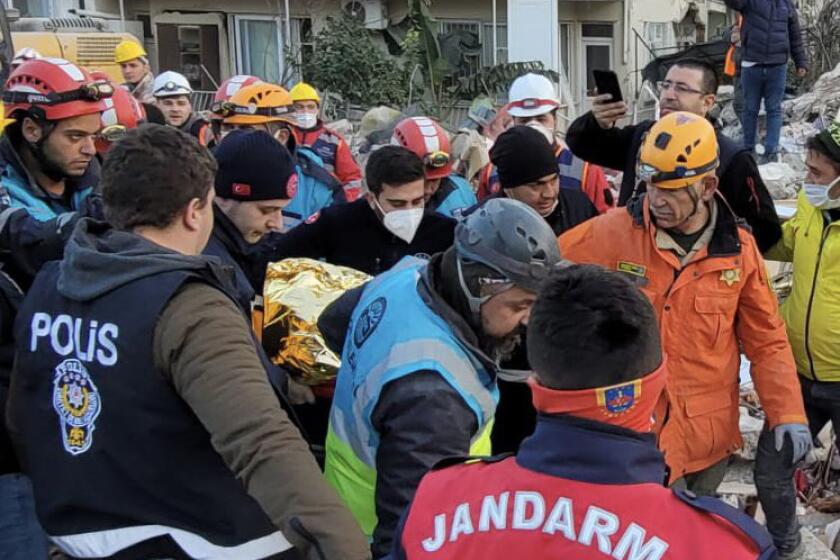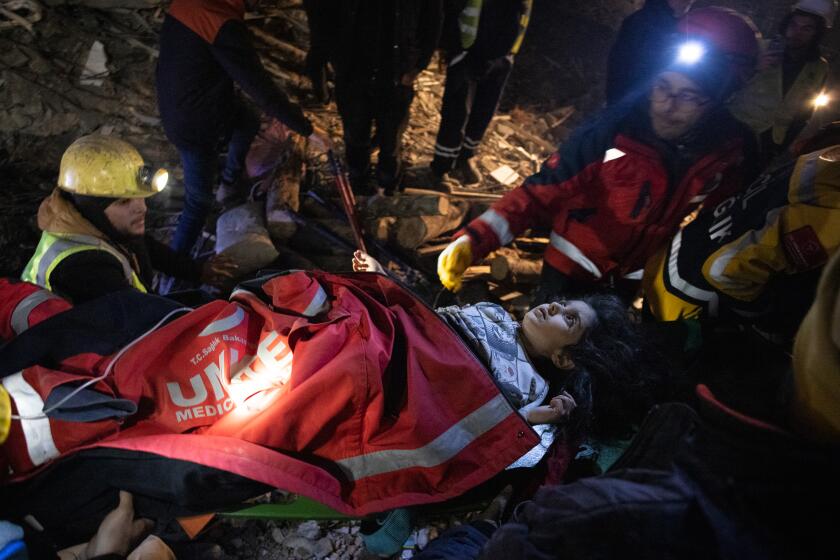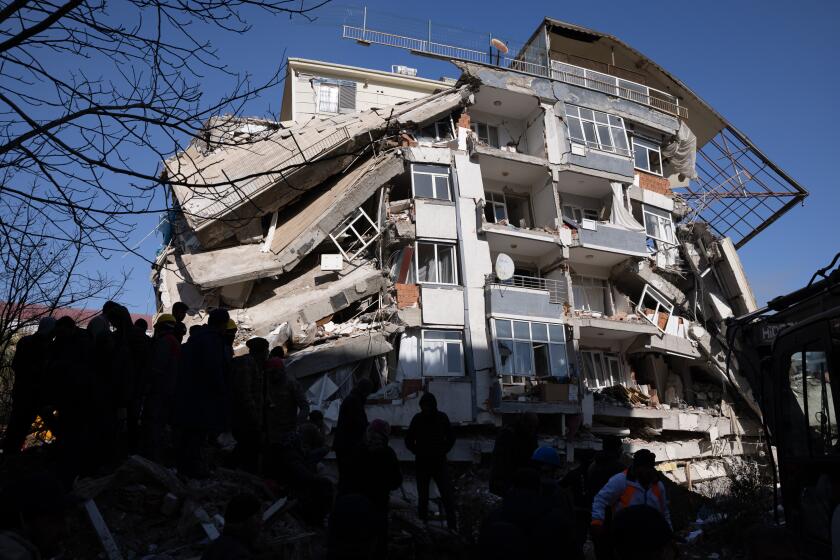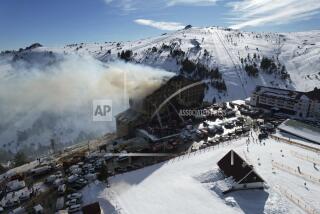Rising toll makes quake deadliest in Turkey’s modern history
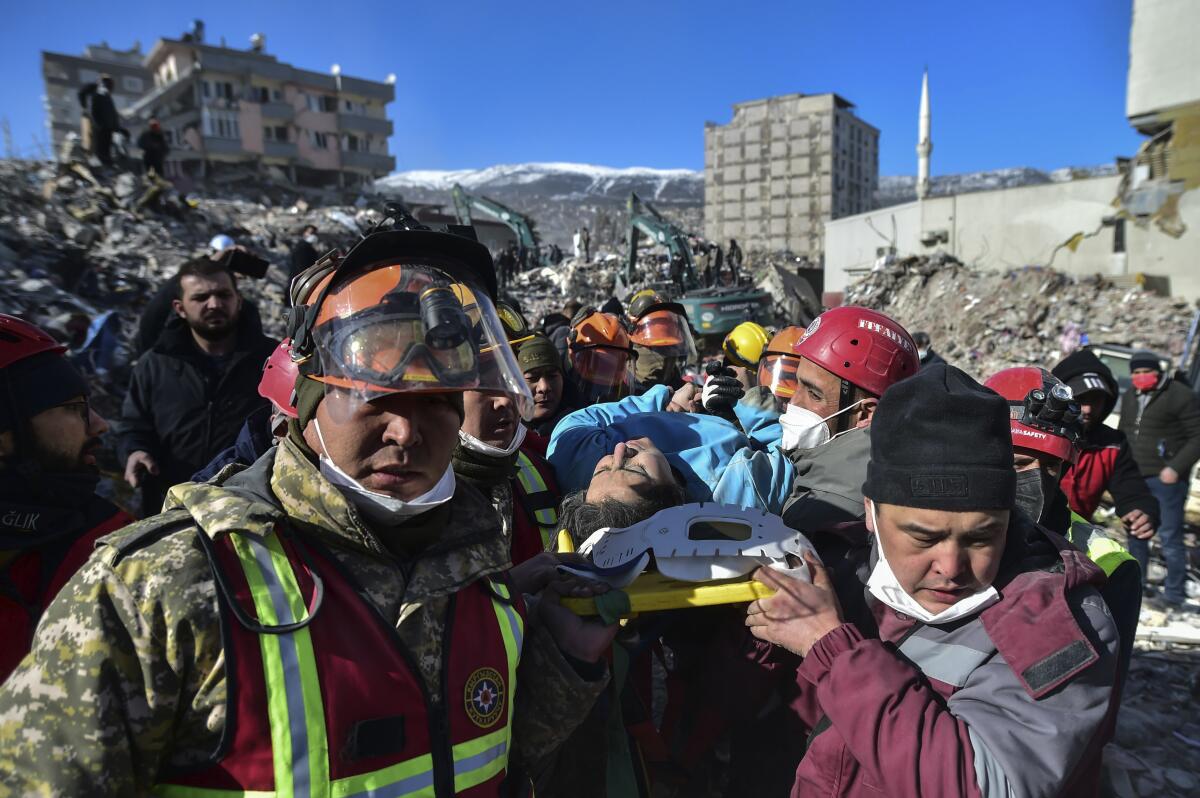
- Share via
ANTAKYA, Turkey — Turkish President Recep Tayyip Erdogan announced Tuesday that more than 35,000 people have died in Turkey as a result of last week’s earthquake, making it the deadliest such disaster since the country’s founding 100 years ago.
The death toll is almost certain to rise even further, and many of the tens of thousands of survivors left homeless were still struggling to meet basic needs, like finding shelter from the bitter cold.
Confirmed deaths in Turkey passed those recorded from the massive Erzincan earthquake in 1939 that killed about 33,000 people.
Erdogan said 105,505 were injured as a result of the Feb. 6 quake centered around Kahramanmaras and its aftershocks. Almost 3,700 deaths have been confirmed in neighboring Syria, taking the combined toll in both countries to more than 39,000.
The Turkish president, who has referred to the quake as “the disaster of the century,” said more than 13,000 people were still being treated in hospitals.
American and Turkish search and rescue teams pull a teenage boy alive from a quake-damaged building in Hatay, Turkey.
Speaking in Ankara following a five-hour Cabinet meeting held at the headquarters of disaster agency AFAD, Erdogan said 47,000 buildings, which contained 211,000 residences, had been destroyed or were so badly damaged that they required demolition.
“We will continue our work until we get our last citizen out of the destroyed buildings,” Erdogan said of ongoing rescue efforts.
Aid agencies and governments were stepping up efforts to bring help to devastated parts of Turkey and Syria.
The situation was particularly desperate in Syria, where a 12-year civil war has complicated relief efforts and meant days of wrangling over how to even move aid into the country, let alone distribute it. Some people there said they have received nothing. In Turkey, meanwhile, families huddled in train cars.
The Syrian Health Ministry announced a final count of 1,414 deaths and 1,357 injuries in areas under government control.
On Tuesday, the United Nations launched a $397 million appeal to provide “desperately needed, life-saving relief for nearly 5 million Syrians” for three months. It came a day after the global body announced a deal with Damascus to deliver U.N. aid through two more border crossings from Turkey to rebel-held areas of northwestern Syria — but the needs remained enormous.
In the days since the magnitude 7.8 earthquake struck Turkey, search-and-rescue teams, including one from Los Angeles County, have been a ubiquitous presence.
Ahmed Ismail Suleiman set up a shelter of blankets outside his damaged house in the town of Jinderis, one of the worst-hit communities in northwestern Syria. He was afraid to move his family back into a house that might not be structurally sound, so 18 people slept outside under the makeshift tent.
“We sit but can’t sleep lying down here,” he said. “We are waiting for a proper tent.”
Mahmoud Haffar, head of the town council, said residents have been able to scrounge up about 2,500 tents so far, but some 1,500 families still remain without shelter — as nighttime temperatures fall to around 26 degrees Fahrenheit.
“We are ... still hearing the question of when will aid get in,” said Haffar.
While tents have been in short supply, one woman said the town had a surplus of donated bread and water.
To the southwest, in government-held Latakia, Raeefa Breemo said only those packing into shelters seemed to be getting aid.
“We need to eat, we need to drink, we need to survive. Our jobs, our lives, everything have stopped,” Breemo said.
Breaking News
Get breaking news, investigations, analysis and more signature journalism from the Los Angeles Times in your inbox.
You may occasionally receive promotional content from the Los Angeles Times.
Offers of help have come from around the world, but the needs remain immense after the magnitude 7.8 quake and powerful aftershocks toppled or damaged tens of thousands of buildings, destroyed roads and closed airports for a time. The quake affected 10 provinces in Turkey that are home to some 13.5 million people, as well as a large area in northwestern Syria that is home to millions.
Much of the water system in the quake-hit region was not working, and Turkey’s health minister said samples from dozens of points in the system showed the water was unsuitable to drink.
In the Turkish port city of Iskenderun, displaced families have sheltered in train carriages since last week.
While many have left in recent days for nearby camps or other parts of Turkey, dozens of people were still living in the trains Tuesday.
“The wagons have become our home,” 50-year-old Nida Karahan told Turkey’s state-run Anadolu news agency.
While a first Saudi aid plane, carrying 35 tons of food, landed in Syrian government-held Aleppo on Tuesday, getting aid to the country’s rebel-held Idlib region has been especially complicated.
Until Monday’s deal between the U.N. and the Syrian government of President Bashar Assad, the global body had been allowed to deliver aid to the area only through a single border crossing with Turkey, or via government territory.
The catastrophic magnitude 7.8 earthquake that struck Turkey a week ago should be a warning to Californians.
The newly opened crossings at Bab al Salam and Al Raee are to function for an initial period of three months. Russia bristled at suggestions that the opening of the crossings might be made permanent, and its Foreign Ministry accused the West of trying to get aid “exclusively” to areas not controlled by the Syrian government.
Major humanitarian organizations welcomed the development but cautioned that logistical problems remain, even as the first U.N. aid convoy with 11 trucks entered northwestern Syria through Bab al Salam on Tuesday.
“This is a constant back and forth in negotiations,” said World Health Organization spokesman Christian Lindmeier. “Every party has to agree to receive convoys.”
The death toll in both countries is nearly certain to rise as search teams turn up more bodies — and the window for finding survivors was closing.
Nevertheless, more than 200 hours after the quake struck, teacher Emine Akgul was pulled from an apartment building in Antakya by a mining search and rescue team, the Anadolu news agency reported.
In Adiyaman province, rescuers reached 18-year-old Muhammed Cafer Cetin, and medics gave him an IV with fluids before attempting a dangerous extraction from a building that crumbled further as rescuers were working. Medics fitted him with a neck brace and he was carted away on a stretcher with an oxygen mask, Turkish TV showed.
News Alerts
Get breaking news, investigations, analysis and more signature journalism from the Los Angeles Times in your inbox.
You may occasionally receive promotional content from the Los Angeles Times.
Many in Turkey have blamed faulty construction for the vast devastation, and authorities continued targeting contractors accused of links with buildings that collapsed. Turkey has introduced construction codes that meet earthquake-engineering standards, but experts say the codes are rarely enforced.
Erdogan announced Tuesday that the government planned to start construction of 30,000 houses in March.
“Our aim is to complete the construction of high quality and safe buildings in a year to meet the housing need in the entire earthquake zone,” he said.
At a temporary shelter in a sports center in Afrin in northwestern Syria, 190 families were sleeping on the floor of a basketball court, lying on mats typically used for training. The families attempted to create a semblance of privacy by hanging blankets on columns or sports bars.
Sabah el Khodr said she and her two toddlers have been sick for the last nine days. The children were wrapped in blankets and sleeping on the floor of the court.
Local officials said the shelter is temporary, until new tents are secured.
Bilginsoy and Wilks reported from Istanbul; Armangue from Antakya, Turkey; and Abby Sewell and Kareem Chehayeb from Beirut. Edith M. Lederer in New York contributed to this report.
More to Read
Sign up for Essential California
The most important California stories and recommendations in your inbox every morning.
You may occasionally receive promotional content from the Los Angeles Times.
